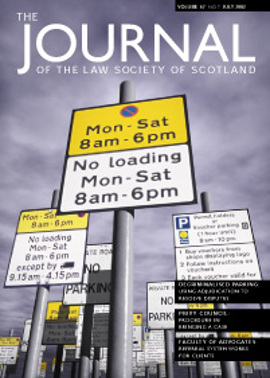In practice
MANDATES
a. Seeking mandates after leaving a firm
The Committee decided that it was not improper for partners who had left a firm and had set up their own practice to send one follow-up letter to clients whom they had previously circulated without reply. It was agreed, however, that more than one follow-up letter would be a breach of the Advertising Rules because if no reply had been received to two communications, the solicitor ought reasonably to know that the client had decided to stay with the original firm.
b. Refusal to implement mandate
In terms of the Society’s recommended Table of Fees, it is proper to charge where files, titles, etc are delivered by one solicitor to another in accordance with the client’s mandate. However, the Committee decided it was improper for a firm to insist on a guarantee from the new solicitors that the fee for doing so (as opposed to fees for work previously undertaken) would be paid before implementing the mandates. The Committee agreed with the view of the Remuneration Committee that the fee for implementing a mandate is not payable until the mandate has been implemented.
POWERS OF ATTORNEY
a. Who is the client?
In 1998 the Committee issued a Practice Guideline reminding the profession that a solicitor must have instructions from his or her client, and that in relation to a Power of Attorney the client is the grantor of the power not the attorney or some other friend/relative. A solicitor was recently found guilty of professional misconduct for preparing a Power of Attorney at the request of a relative. The grantor was not seen by the solicitor at any time and no steps were taken by the solicitor to check the grantor’s capacity or instructions.
These circumstances arose before Sections 15 and 16 of the Adults with Incapacity (Scotland) Act 2000 came into force. If a solicitor is signing a certificate in terms of either of these Sections, the solicitor must have interviewed the grantor immediately before the grantor subscribed the document.
b. Mental capacity
Solicitors are not the judges of mental capacity. That is a matter for the medical profession from whom advice should be sought if there is any doubt as to a client’s capacity. Sections 15 and 16 of the Adults with Incapacity (Scotland) Act 2000 requires a solicitor signing a certificate to be satisfied that the grantor understands the nature and extent of the document. Solicitors signing such certificates should consult the relevant medical practitioner if it is not clear to the solicitor that the grantor is capable and able to give coherent instructions.
c. Taking account of the grantor’s views (confidentiality)
In view of the requirement in the Adults with Incapacity (Scotland) Act 2000 to take account of present and past wishes and feelings of incapable adults, solicitors may be asked to give information about a will that the adult may previously have made. The Code of Practice issued by the Public Guardian states that the issue of access to confidential information should be covered in the original Power of Attorney. The Committee felt that this is a matter on which advice would need to given when a solicitor is taking instructions for a Power of Attorney and specific instructions should be sought on this matter at that time.
EXECUTRY – SOLICITORS DUTIES WHERE WILL CHALLENGED
If solicitors are instructed by Executors – or are themselves Executors – appointed by the will of the deceased, they are entitled to proceed in accordance with the will until ordered not to do so by the Court unless they are aware from their own knowledge that the will is invalid. They do not require to cease dealing with the estate simply because they are advised that another party is seeking to challenge the validity of the will.
SHARING PREMISES WITH OTHER BUSINESSES
There are no Practice Rules dealing specifically with the sharing of premises, although there are Practice Rules which prohibit the sharing of fees with unqualified persons and prohibit solicitors forming a Multi Discipline Partnership. However, the Code of Conduct states that client confidentiality is a fundamental duty of solicitors. The Committee therefore agreed that solicitors may share premises with a non solicitor business provided they ensure (a) that client confidentiality is maintained and (b) that there is no confusion in the minds of the clients of either the solicitors business or any other business in the premises about whom the client is dealing with. That requires clear signage both outside and inside the building showing the parts occupied by the solicitor and the parts occupied by the other business/businesses.
OUTSOURCING OF INVOICING AND OTHER OFFICE SERVICES
The Committee agreed that solicitors would not be acting in breach of the Society’s Practice Rules by using a third party company to invoice clients provided that the third parties were bound by a confidentiality agreement. The Committee felt that this would be similar to instructing a Law Accountant to prepare an account. The Committee agreed that solicitors would be entitled to pay commission to the third party company for providing this service.
In this issue
- Opinion
- Substantial preparation can bring reward
- End of an era
- Benefits of referral system hold true
- Resolving parking disputes out of court
- Keeper’s corner
- Take care with standard phrases
- Scottish Solicitors’ Discipline Tribunal
- What price the core values?
- Releasing talent through solicitor advocacy
- No, Minister
- Website reviews
- Serious attack on stamp duty avoidance
- Plain speaking
- Family funded purchases
- In practice
- Book reviews






